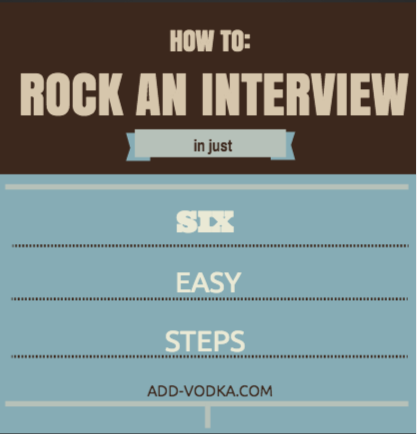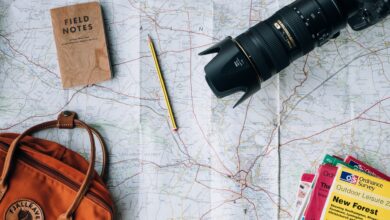How to do Well in an Interview
So, you’ve read my post about resume writing and you snagged an interview (probably because you wrote your resume properly). Congrats!
The fun isn’t over yet, and unfortunately you’ve entered the most time consuming part of your job search. Interviewing is no walk in the park but it’s crucial that you rock the socks off of your interviewers so you can get that dream job that you’ve been waiting on for your whole life.
Preparation is key when it comes to blowing an interview out of the water, and recruiters and hiring managers know the difference between somebody who prepared and somebody who didn’t. Reading this is your first step, but you have a lot more work to do.
Here are some suggestions, from a recruiter, that will make the difference when it comes to your interview:
Spend some quality time with the job description
Remember how you printed out the job description and highlighted all the key skills and abilities that the position needed? The Human Resources profession calls these skills competencies, and you need to get intimate with them.
Grab that job description again, and think of specific examples of times when you displayed these competencies.
An example: if the job description mentions that a key competency is the ability to show initiative, my example might be about a time when I initiated a workshop on something that I felt my co-workers and I needed to learn more about.
Now write the example down. Make sure it’s a positive example, and underneath it, list all of the skills you used in that initiative. You might have used leadership skills, organization skills, or communication skills.
Consider whether any of the skills you may have used in that example correspond to a competency in the job description. If so, great! Many examples of your achievements can be used for more than one competency.
Do this for each competency that is necessary for the job. This will help you immensely with the behavioral interviewing questions – ie the “tell me about a time when..” and “can you describe a time when you..” questions which are notorious for being difficult to answer.
People tend to find the behavioral questions really hard, but they are only hard if you don’t prepare for them.
Then, dig deep into your mind
Sometimes interviewers are interested in seeing the characteristics and behaviours that you possess that are not necessarily in the job description.
Write down 3 examples of things that you have done that you are really proud of. Write down the idea, the way you carried it out or achieved the goal, and the end result. You can use things from your personal life, if you don’t have anything professional to recall. In interviews, an interviewer likes to see a well rounded person, so using an example from your personal life can serve you well at times.
Say you planned your friends wedding for her. You decided you were going to help her out, arranged the cake, the flowers, the seating arrangements, the transportation, the guest lists, invitations, and emceed the event. While you were doing this, I have no doubt that you had to communicate effectively with a billion different people. Finally, your friends wedding was a success. The bride and groom were happy and the day went without a hitch because you were so organized.
Write three of these types of scenarios down. Make sure to use quantifiable results, if you can. For instance, if you noticed a problem at work and corrected it, saving the company $1200, note the positive outcome. Make sure to write down the number so that you remember it, and don’t fudge anything.
Let’s remember something negative
To be really great in an interview, sometimes you have to gracefully recall a mistake that you made. Interviewers know that you make mistakes. You are human. They might ask “Tell me about a time when you did something that didn’t turn out very well”. To be prepared for your interview, you will have to have a negative example ready as well as all of the positive things. Make sure it is something you worked through: maybe you made a mistake and it caused conflict between you and somebody else. It turned out okay because you and that person communicated effectively and worked through the issue by compromising and collaborating.
Keep this in your back pocket just in case.
Practice with your dog
Or your friend, or mom, or yourself in the mirror. Just practice. Google behavioural interview questions. Ask them to yourself and give yourself an answer for each one. If you can’t answer one that you came across, think of an example for it! No question should be left unanswered, because with any luck, that’s the question the interviewer will ask.
Practice, practice, practice.
Just calm down
Luckily, with all of that practice you’ve had, you will be confident enough to rock your interview. Knowing the answers to any possible question helps with nerves considerably. Confidence is key.
However, if you are still a little nervous, play a song that you like, think about something else, do anything to calm yourself down. Nervousness fosters mistakes, so just relax. The interviewer is human too.
Ask questions
Never go into an interview without a list of questions to ask the company. When the interviewer asks if you have any questions for them, ASK. Show that you are interested in the job and the company. Just don’t ask questions that you would have found out had you done your research. That will show the interviewer that you didn’t prepare.
Maybe list 5 questions to ask during the interview, because some might be answered before you get to them. That’s fine, because you will have a couple more when the time comes!
Feel free to bring the list in to the interview. It will show that you are prepared and had thought ahead.
If you are thorough and well prepared, it will shine through and you will dazzle your interviewers.






Great post. Also it is great to mention what you learned from a certain situation, rather than just describing what happened.